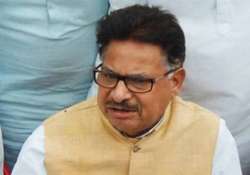Dimapur lynching was bad but it could act as deterrent: Punia
New Delhi: National Commission for Scheduled Castes Chairman P L Punia today condemned the Dimapur lynching but said such incidents could instill fear into those involved in crime against women.Punia, also a Congress Rajya Sabha

New Delhi: National Commission for Scheduled Castes Chairman P L Punia today condemned the Dimapur lynching but said such incidents could instill fear into those involved in crime against women.
Punia, also a Congress Rajya Sabha MP, called upon the dalits and adivasis to get organised so that nobody dares to misbehave with their women.
Addressing an event, Punia said Bhim Rao Ambedkar always wanted the two communities to emerge stronger so that they get equal rights and there was no discrimination against them.
“Baba Saheb wanted us to get organised and be powerful, and the power should be such that people get scared of it.
There are families whose women cannot be misbehaved with as people fear them. Similarly, people should fear you as well,” Punia said.
“Fear should be such that people should tremble out of it. The Dimapur lynching incident was bad but in certain way it was good as such people will be scared (after this incident). To generate this sort of fear, Baba Saheb had said that be organised. He wanted us to be organised in such a way that nobody can think of victimising us,” he added.
He was speaking at the launch of Atrocity Tracking and Monitoring System (ATM), a unique system where members of the two communities can complain about any atrocity meted out to them through SMS.
The system has been developed by National Dalit Movement for Justice (NDMJ). A victim or any activist working for them can send an SMS by typing ‘NCSPOA' and send it to 9898915455.
The service involves the generation of an SMS which would be received by the respective state member organisation for taking action on the information received.
The registered user organisations can then send SMS to the case related officials from the ATM web page after which the complaint will be received by the government officials for speeding up the legal process.
Punia hailed the efforts of NDMJ for the introduction of the website and slammed the government for not doing enough to tackle the problems of the people.
“The government has totally failed to develop such a system like you all have done. I would urge the Home Minister that Independence is not worth if the people are not getting their right to speak,” Punia said.
The website has sections like reports and fact findings and one can easily track status of a case through the system.
“The system enables a registered user to upload fact finding cases as intervened by Dalit human right activists and organistaions in previous years as case studies in order to maintain a comprehensive database of the atrocity cases thus helping to amplify the efforts of human rights organisations,” said one of the organisers.